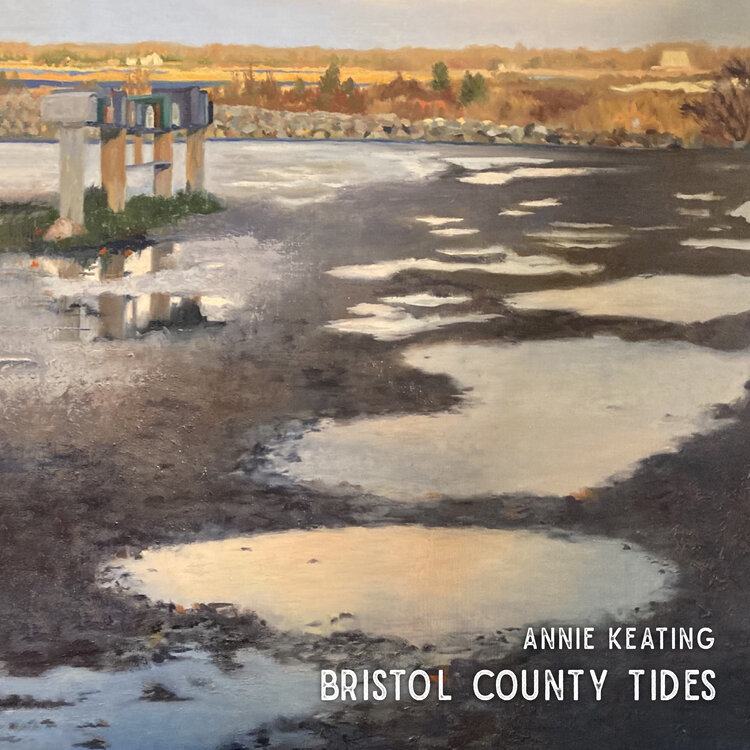Annie Keating Embraces Uncertainty on New Album
By Allison Kinney, Staff Writer

Annie Keating‘s eighth album wanders through Bristol County Massachusetts, where Keating and her family went to ride out the spring and summer of 2020 (rough waters – you remember.)
But rather than trying to replicate the feeling of the pandemic in song (I imagine it as an endless dissonant drone, punctuated by screams) Bristol County Tides provides a collection of songs to help with getting through hard times. Songs that rock out. Songs that rock you to sleep.
The pandemic that drove Keating & co. from Brooklyn to her mother’s Bristol County cottage appears only in passing allusions and metaphors, “a fire in the rearview mirror”. The lyrics focus less on the hard times themselves and more on the process of getting through them. The peculiar holding-pattern momentum of chronic uncertainty. The way we “wade on through”.
Keating’s voice has a warm, radio-static sound. Rough-smooth, like driftwood or a banister with the varnish worn away. Sometimes her writing exceeds her voice’s limits and she scrapes the bottom of her range; lets lines run her almost out of breath. Her voice is the one sonic element of these songs that isn’t as polished and precise as the tiny gears inside a watch.
The bass (courtesy of Teddy Kumpel and Richard Hammond) in conjunction with Steve Williams’s drums, especially on the first songs, works on me like those machines they use to restart your heart. The instruments create a vivid postcard-come-alive world that Keating’s voice, like her characters, shuffles, swaggers, and wanders through. The stylistic contrast between vocals and instrumentals, along with Keating’s clarity of diction, puts a spotlight on her lyrics.
The album begins out in the world, meeting the boys on “Third Street,” but by “Half Mast” the songs show clear impressions of 2020: “Time is moving slow/ Thoughts are racing fast/Nowhere much to go/ Flags at half-mast.” The songs navigate the peculiarities of pandemic time. When days of the week are less relevant than shifts in the quality of light or the sway of the tides.
One thing you won’t find on this album is an explicitly queer love song. I thought that “Doris” might be one, but it’s about Keating’s mother (to whom the album is dedicated.) We can always pretend though; if you’re looking for a soundtrack for yearning, may I recommend “Shades of Blue”. A good song for when you want to cry and can’t remember how.
It’s one of the few songs here where Keating’s voice really takes flight. On most of the album, she gravitates toward her lower register. An understandable move; there’s slouching, gritty power down there and strength that can be hard to hold on high notes – but she does hold it. You have to really want the high ones, and often the wanting stains them shades of blue.
In many of these songs, the singer is anchored in the present by immediate physical details of water and woodlands, the old town, and new friends who can, for a moment, seem to turn back time: “You make me feel like summer has just begun,” Keating sings on “Hank’s Saloon.”
The relationships on this album, from the momentary to the monumental, buoy the singer amid the shifting uncertainty of the times. I didn’t believe in the future for most of summer 2020 – I just couldn’t imagine it. That didn’t stop the future from coming of course. No matter our plans, “life’s a ride into uncertainty” as Keating choruses on “Nobody Knows”.
But Keating doesn’t let anyone escape uncertainty entirely. On “Nobody Knows” she sings a wish “to go to a time before machines, to fire, water, and clear streams, where something buried deep beneath, rattles like a ghost in me.” The refrain that haunts the speaker’s self-discovery and new relationship follows her even to the imaginary idyll of the past, a reminder that nostalgia is a riptide that pulls to places that never really existed.
Keating’s characters find no refuge from the unknown, not in plans, not in the past, not in another person. “I will resist reducing this to anything less than nameless” she sings on “Kindness” – the strength of this album’s storytelling is its scrupulous, detailed documentation of encounters with what can’t be named.